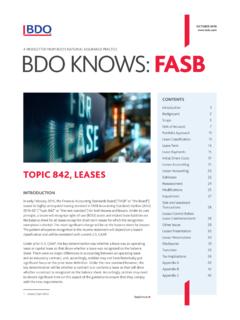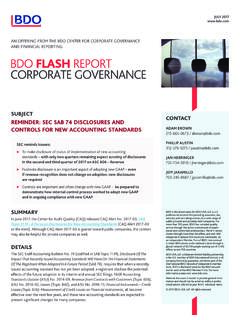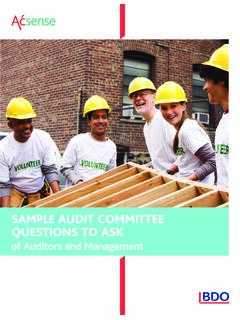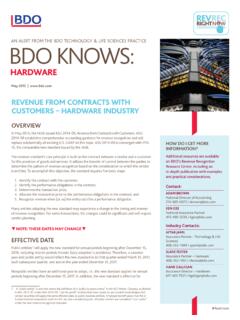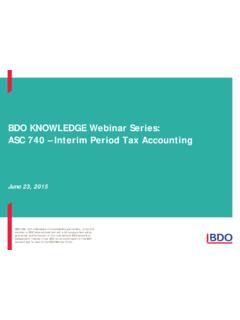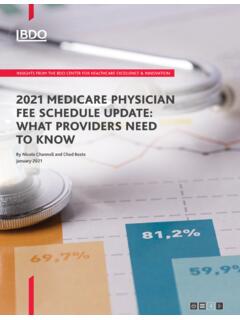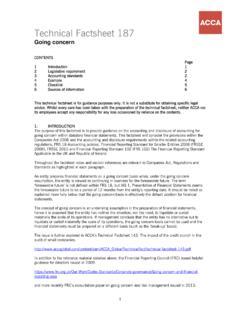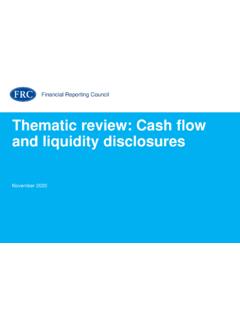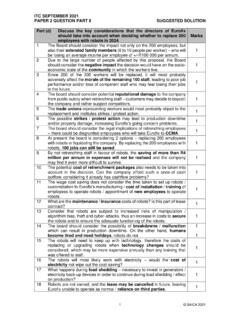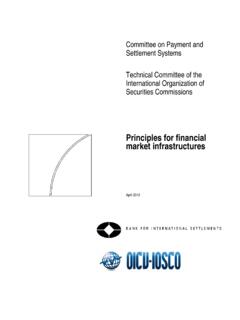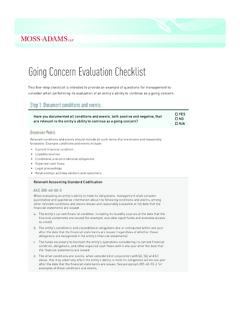Transcription of BDO KNOWS COVID-19 – Accounting, Reporting and Other ...
1 BDO KNOWS COVID-19 Accounting, Reporting and Other Related Considerations MARCH 2020 COVID-19 ACCOUNTING, Reporting AND Other RELATED CONSIDERATIONS 2 Table of Contents BACKGROUND .. 3 ACCOUNTING AND FINANCIAL Reporting .. 4 SEC REGISTRANT DISCLOSURE CONSIDERATIONS .. 5 FINANCIAL STATEMENT DISCLOSURES .. 8 Disclosure of Loss Contingencies .. 8 Cash Flow Statement Presentation of Insurance Proceeds .. 8 Risks and Uncertainties Disclosures .. 8 going concern .
2 9 Subsequent Events .. 9 ACCOUNTING CONSIDERATIONS .. 10 Loans and Receivables .. 10 Inventory .. 10 Investments .. 11 Indefinite-Lived Intangible Assets .. 11 Long-Lived Assets .. 11 Goodwill .. 12 Oil and Gas Reserves .. 12 Temporary Differences and Deferred Tax Asset Valuation Allowances .. 13 Debt .. 13 Derivatives and Hedge Accounting .. 14 Fair Value Measurements .. 14 Revenue Recognition .. 15 Leases .. 16 Stock Compensation .. 17 Business Interruption Insurance Recoveries .. 17 Contingent Losses.
3 18 Exit Activities .. 18 AUDITING CONSIDERATIONS .. 19 Heightened and new financial Reporting risks .. 19 Obtaining sufficient appropriate audit evidence .. 19 Impact on the audited entity, its control environment, and its ability to provide 20 COVID-19 IMPACT TO THE DISCLOSURES AND AUDIT REPORTS .. 21 EXAMPLE SUBSEQUENT EVENTS DISCLOSURES .. 24 CORPORATE GOVERNANCE AND SHAREHOLDER CONSIDERATIONS AND COMMUNICATIONS .. 35 COVID-19 ACCOUNTING, Reporting AND Other RELATED CONSIDERATIONS 3 FURTHER RESOURCES.
4 39 KEY CONTACTS .. 39 Background This guidance can be supplemented with further information and content available for use at BDO s COVID-19 Resource Center. The novel coronavirus ( COVID-19 ) outbreak is a serious and unprecedented public health threat. It has interrupted the movement of people and goods throughout the world, and many levels of government are instituting restrictions on individuals and businesses. The resulting impact on financial Reporting will be significant. Significant development and spread of COVID-19 did not take place until January 2020.
5 At December 31, 2019, only certain events and associated actions had taken place, such as the Wuhan Municipal Health Committee s issue on December 30, 2019. Although cases were reported to the World Health Organization (WHO) on December 31, 2019, the WHO did not announce the coronavirus as a global health emergency until January 30, 2020, which prompted national governments to begin putting actions in place to slow the spread of COVID-19 . In addition, significant measures taken by the Chinese government and by private sector organizations did not take place until early 2020.
6 Subsequent market disruptions in February 2020 confirmed the significance of the January developments. Based on the timing of these events, for calendar year-end companies, the effects of the coronavirus represent a subsequent event that is not expected to impact amounts recognized in the year-end financial statements ( , a non-recognized subsequent event). Accordingly, forecasts, projections, and associated assumptions used in preparing financial statements as of December 31, 2019 would reflect either little or no change solely as a result of the coronavirus outbreak.
7 However, debt classification may be impacted, as discussed below. For Reporting periods ended on or ending after January 31, 2020, the effects of the novel coronavirus need to be incorporated into the preparation of financial statements. The effects of the novel coronavirus may be widespread and relate to many industries; they are not limited only to entities operating directly in the travel and tourism industry ( , airlines, tour operators, etc.). COVID-19 may affect entities in nearly every sector, due to the following and Other impacts: Reduced consumer demand for goods and services due to lost income and/or restrictions on consumers ability to move freely; Disruption of global supply chains due to restrictions placed on the movement of people and goods; Lack of investment in capital improvements and construction, reducing demand for many goods and services.
8 And Reduction in market prices for commodities and financial assets, including equity and debt instruments. The financial Reporting implications for entities may be similarly broad, and the precise effects will depend on the facts and circumstances of each entity. As time elapses and the effects of the outbreak change and evolve, it may STATUS Effects of the coronavirus outbreak are still developing daily. ACCOUNTING IMPACT Widespread asset impairments along with a myriad of effects on Other financial statement line items; potential effect on going concern .
9 COVID-19 ACCOUNTING, Reporting AND Other RELATED CONSIDERATIONS 4 become difficult to distinguish which information and facts and circumstances should be incorporated into measurement as of period end and which should result in potential subsequent events disclosure. Accounting and Financial Reporting The following are financial Reporting and accounting considerations that entities need to consider. As noted above, for entities with year-ends of or prior to January 30, 2020, the effects of COVID-19 represent a subsequent event that is not expected to impact amounts recognized in the year-end financial statements ( , a non-recognized subsequent event).
10 Accordingly, forecasts, projections, and associated assumptions used in preparing financial statements as of December 31, 2019, would reflect either little or no change solely as a result of the coronavirus outbreak. However, debt classification may be impacted as noted in the table. Considerations for December 31, 2019 Year-End Financial Statements* * Includes year-ends through January 30, 2020 Considerations for January 31, 2020 Year-End and later Financial Statements Treat COVID-19 as a non-recognized subsequent event, as follows: Treat COVID-19 as a recognized event, and incorporate the effects in the financial statements, including recognition, measurement, and disclosure, as follows.
